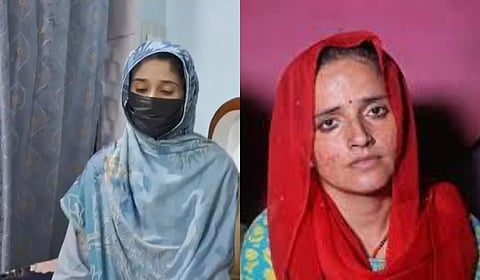

LUCKNOW: While the Uttar Pradesh Police claims that the deportation of Pakistani nationals is almost complete following the Pahalgam terror attack, the fate of individuals like Maryam in Bulandshahr and Seema Haider in Noida remains uncertain.
Maryam, a three-month pregnant Pakistani national, who got married to Amir of Khurja in Bulandshahr in July 2022, is finding it difficult to go back to her native land saying that she is now India’s daughter-in-law.
Maryam had come to Bulandshahr in February, 2025 on three-month tourist visa to spent time with husband after leading separate lives post-wedding for three years.
Maryam has requested the PM to allow her stay as she is three-month pregnant. “I was born a Pakistani but now I am an Indian bahu. I don’t want to go back. I want to live here as an Indian at heart,” says an emotional Maryam, 29, whiletalking to media persons.
Desperate to stay with her husband, Maryam says she has petitioned the President through the Bulandshahr senior superintendent of police, seeking a long-term visa in light of her pregnancy.
According to her account, Maryam, who hails from Islamabad, had an arranged marriage with Amir. However, after the wedding, she was unable to secure a long-term visa and has been living with her parents for the past three years.
Following Amir's suggestion, Maryam had arrievd in India on a three-month tourist visa on February 12, 2025. She applied for a long-term visa on March 15, but her application is still pending. Now, following the Centre’s directive after the Pahalgam attack, she faces the possibility of deportation.
While Bulandshahr SSP Dinesh Kumar Singh confirmed that Maryam would remain in Bulandshahr for now and a final decision on her deportation would be made after further guidelines from the government.
Amir, however, said they would abide by government directives. “We have submitted a ‘mercy petition’ to the President. We trust the administration’s decision and will comply accordingly,” he said.
Authorities revealed that 18 Pakistani nationals are currently residing in Bulandshahr on long-term visas. These individuals, all married to Indian citizens, have applied for Indian citizenship and are under regular watch by police and intelligence agencies. However, four Pakistani women, who were in India on short-term visas, have already been sent back.
On the other, Seema Haider, the Pakistani national who entered India through Nepal illegally, has said that she would prefer to die rather going back to Pakistan.
She met her current husband, Sachin Meena of Meerut, online and entered Indian territory through the Nepal border. Seema and Sachin got married and now have a daughter who is just a couple of months old. Seema has also appealed to Prime Minister Narendra Modi and Uttar Pradesh Chief Minister Yogi Adityanath to allow her to spend the rest of her life with Sachin in India.
On the other hand, Seema’s ex-husband, Ghulam Haider, has released a video appeal urging Indian authorities to send his four children, currently living with Seema, back to Pakistan, as they are Pakistani citizens. In the video, Haider pointed out that while those who had entered India on valid visas were being deported, no action was being taken against Seema, who he claimed was residing in India illegally.
Meanwhile, UP DGP Prashant Kumar said that the state had completed deportation of almost all the Pakistani nationals eligible for the process. He added that only one Pakistani citizen remained to be deported on Wednesday.
So far, 50 Pak nationals, who had been in UP on short-term visas and other categories of visa, left the state till April 27. However, around 1000 are still in the state living on long-term visas. Among them mostly are those who are either married Indian citizens or are on diplomatic visa with medical issues.
The UP DGP also claimed that in the light of the Pahalgam incident on April 22, strategic reserves of police force were deployed at critically sensitive points across the state to respond any emergent situation with alacrity. He claimed that the police authorities were actively coordinating with intelligence agencies to maintain effective early warning system.
Intensified border checks, surveillance at religious sites, drone monitoring of airports, railway stations and bus terminals besides security arrangements around Kashmiri students, tourists and traders in the state had also been spruced up.